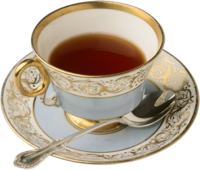Tea and Milk

Growing up in England, tea is a great deal more than a drink.
Always drunk hot, of course. No normal person would want it served cold.
It is a major social lubricant and is considered by most to be a separate food group. And the health benefits conferred by a nice cup of tea are now known to just about everyone in Britain.
But from an early age I knew that one day I would have to leave the country.
Why?
Because I could never abide the way in which the vast majority of tea drunk in England is destroyed by the addition of milk and sugar. There are even long technical debates about whether to add the milk before pouring in the tea or after? How fast to add the white stuff? How to stir it in?
Since I was knee high to a puppy I was always the odd one out, wanting nothing to do with this wanton destruction of a sublime beverage.
Which should always be enjoyed au naturel. The only thing that might ever sully a cup of fine Earl Grey or Darjeeling might be a little lemon. Anything else?
Yuk.
Well, it now transpires that this isn’t just a matter of taste buds.
A study just published in the European Heart Journal says it all in the title, “Addition of milk prevents vascular protective effects of tea.”
Tests on sixteen healthy postmenopausal female volunteers showed that black tea significantly improved the ability of the arteries to relax and expand, but adding milk completely blunts the effect. The research was supplemented by tests on rat blood vessels. Tea caused the muscle in the vessel wall to relax by producing nitric oxide from the endothelial cells that line blood vessels. Adding milk blocked the production of nitric oxide and the relaxation of the muscles.
Now bear in mind that they were testing black tea. The researchers are now looking at the potentially more potent green tea to see whether its effects are also blocked by milk.
The villain of the piece is a group of proteins called caseins, which they found interacted with the tea to decrease the concentration of catechins in the beverage. Catechins are the flavonoids in tea that mainly contribute to its protection against cardiovascular disease.
The moral of the story? Tea can be wonderful on so many levels. Not only does it taste good, but also it can do wonders for your health.
But please, please, please don’t lose all the benefits by sloshing in a load of milk!
Raw, naked tea is the way to go…
“Thank God for tea! What would the world do without tea? How did it exist? I am glad I was not born before tea.”
–Sydney Smith (English Clergyman and Essayist, 1771-1845)






